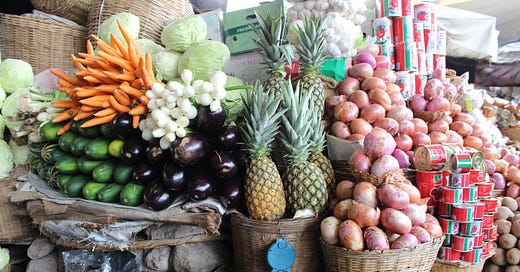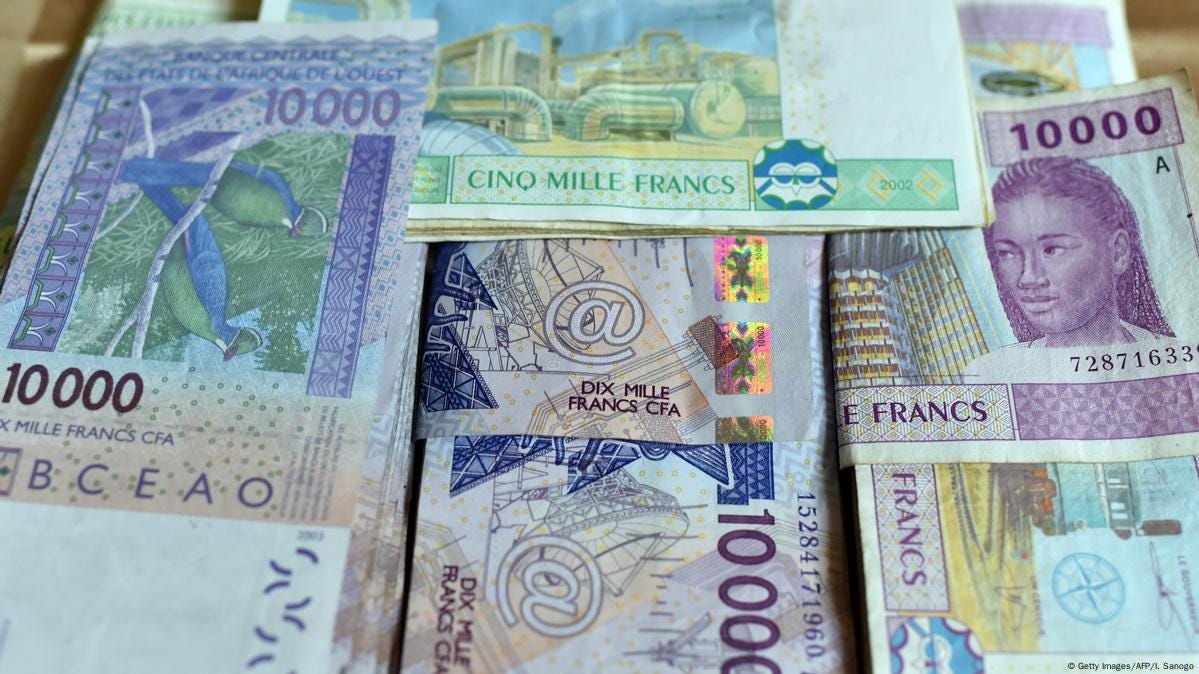It’s 11:33 AM on Wednesday, and 13-year-old Habibatou is seated at her mother’s stall in Dantokpa Market, the largest open-air market in West Africa. She should be in school, but today, like many other days, she is helping her mother.
When a customer arrives and hands over a 10,000 CFA franc note, Habibatou gets up. "Habibatou, get the change," her mother calls out. She loves this part. Ducking behind the stall, she opens their old tin box and carefully counts out the smaller bills.
As she always does, she wonders, "Why do these big notes exist? Why are the 10,000 CFA notes considered special? Why can't all notes be small like the ones I use to buy my favorite Akassa from Maman Josette's stall?" She imagines everything she could buy with a 10,000 CFA note—a new dress, school books, maybe even a bicycle.
“Mama,” she asks one day, counting out change for the third 10,000 CFA note that morning, “where do these notes come from? Who decides we need them? Why are they called francs?”
Mama pauses from arranging pineapples, considering how to explain central banks, colonialism, and monetary policy to a child who should be learning multiplication tables in school. “These notes,” she begins, “are like promises from the bank. They represent value—the work we do, the goods we sell.”
“But what if we had different notes, Mama? Would it make things better?” Habibatou asks.
Her mother’s response is simple yet profound: “Whether it’s 10,000 CFA or other bills, what matters isn’t the paper itself, but what we can do with it.”
In that moment in the heart of Cotonou, Habibatou learned something even her classmates in school weren’t learning - the value of money.
Disclaimer: I write about personal finance, not macroeconomics or political theory. While these fields overlap (you can't be good with money without understanding a bit of everything - economics, politics, psychology, and sociology, etc.), I'm not claiming to be an expert in any of them.
There are countless, better-researched articles about the CFA franc written by actual economists and political analysts. This isn't one of them.
What is Currency?
At its core, currency is simply a medium of exchange - a tool we use to trade goods and services. Think about Habibatou's 500 CFA franc note: it's just paper, but it represents value that both buyer and seller agree upon. This shared agreement on value is what makes currency work.
The CFA Franc: A Brief History
After World War II, France established the CFA franc for its African colonies in 1945. Originally, CFA stood for "Colonies Françaises d'Afrique" (French Colonies of Africa). Today, it represents "Communauté Financière Africaine" in West Africa and "Coopération Financière en Afrique Centrale" in Central Africa.
The West African CFA franc (XOF) is used by eight countries: Benin, Burkina Faso, Côte d'Ivoire, Guinea-Bissau, Mali, Niger, Senegal, and Togo.
The Central African CFA franc (XAF) is used by 6 countries: Cameroon, Central African Republic, Chad, Republic of Congo, Equatorial Guinea, and Gabon.
In December 2019, eight West African countries announced plans to replace the CFA franc with a new currency called the "Eco." While delayed for various reasons, this transition represents a shift from French monetary influence.
The Great Debate: Neocolonialism or Economic Stability?
The CFA franc debate typically splits into two camps:
The Critics Say:
The currency represents continued French colonial control
The fixed exchange rate to the euro limits economic sovereignty
The requirement to keep 50% of reserves in the French treasury is exploitative
European rather than African interests dictate monetary policy
The Defenders Counter:
It's a financial safety net: prices stay stable, inflation stays low
Trading between African countries becomes easier
International investors trust it more than other African currencies
Countries are free to leave the system (like Mali in 1962 and Madagascar in 1972)
Both sides present valid arguments. I believe that for a state or a people to achieve true independence, control over their currency is essential—it's common sense. However, the CFA also has merits that many people overlook or downplay, particularly regarding growing wealth.


While France’s role in French Africa has clear neocolonial aspects, its economic impact might be overstated. A compelling example of this is France's declining economic influence in Africa. Despite maintaining 1,100 business groups and 2,109 subsidiaries, France's market share in Africa has dramatically declined. According to a 2018 study by COFACE (French Export Credit Insurance Company), French exports to Africa represent only 5.4% of its total global exports - a 50% decrease from the early 2000s.
In fact, France's largest trading partners in Africa—Algeria, Morocco, Tunisia, Nigeria, and South Africa—operate outside the CFA franc zone. This suggests that the CFA franc's role in maintaining French economic dominance might be less significant than often portrayed.
Stock Market: Money on Steroids
As I have previously discussed, the stock market is the best wealth-builder in the world. Africa isn’t an exception. With 29 stock exchanges across the continent, including the Johannesburg Stock Exchange (JSE)—the 16th largest stock market globally—African markets offer significant opportunities for wealth creation.
One of the main concerns in investing in African equities is currency volatility. This is where the CFA demonstrates its value: Unlike other African markets that face significant currency volatility, the BRVM's connection to the CFA franc—pegged to the euro—provides a rare currency stability level in African markets. From January to October 2024, the BRVM Composite Index rose 26.59% in CFA terms and maintained a similar return of 24.63% in USD, surpassing the S&P 500's (20.1%) increase. This makes the BRVM an attractive option for both local and international investors.
A $10,000 investment made in January in the BRVM would have seen their investment grow to $12,463 by the end of October 2024, reflecting a 24.63% increase in dollar terms. This performance underscores the BRVM's ability to deliver strong returns with minimal currency risk. In contrast, despite a 28% local currency gain, the same investment in Nigerian stocks would have lost value in dollar terms due to a 50% currency depreciation.
Moreover, through a single exchange, investors gain exposure to eight growing West African economies, spreading risk while maintaining currency stability.
The BRVM has seen consistent growth in market capitalization and trading volumes, while other African exchanges have struggled with liquidity issues due to currency risks. This allows businesses in the CFA zone to plan long-term investments more confidently, knowing their currency won't suddenly lose half its value.
The BRVM's performance tells us something interesting about building wealth in Africa: While CFA debates spur around about France’s neocolonial exploitation (rightfully so), its stability has created something valuable - a reliable way to grow wealth through the stock market. Think about it: the CFA zone is a gem in a continent where currency problems can wipe out your stock market gains overnight.
This stability isn't just about keeping money safe. The data shows that very few regular people in Africa invest in stocks — it's mostly big institutions making all the money. However, with a stable currency like the CFA franc, more people could start realizing wealth through the stock market, just like in other parts of the world.
Remember what Habibatou's mother said about money being a tool? Well, maybe that's how we should think about the CFA franc. We should ask how to use this stability to help more Africans build wealth and achieve real economic independence, setting up a transition path to our own currency.
The BRVM's success makes you wonder - Is stability more valuable than sovereignty? That's the million-franc question, and I'll let you think on that one






“ In December 2019, eight West African countries announced plans to replace the CFA franc with a new currency called the "Eco." While delayed for various reasons, this transition represents a shift from French monetary influence.”
It is Ecowas plan that represents a shift from France influence. The December 2019 operation was actually a manipulation to circumvent Ecowas vision
“ As I have previously discussed, the stock market is the best wealth-builder in the world. Africa isn’t an exception. ”
African should, MUST, find other ways to build wealth, than the Keynesian-inspired economy